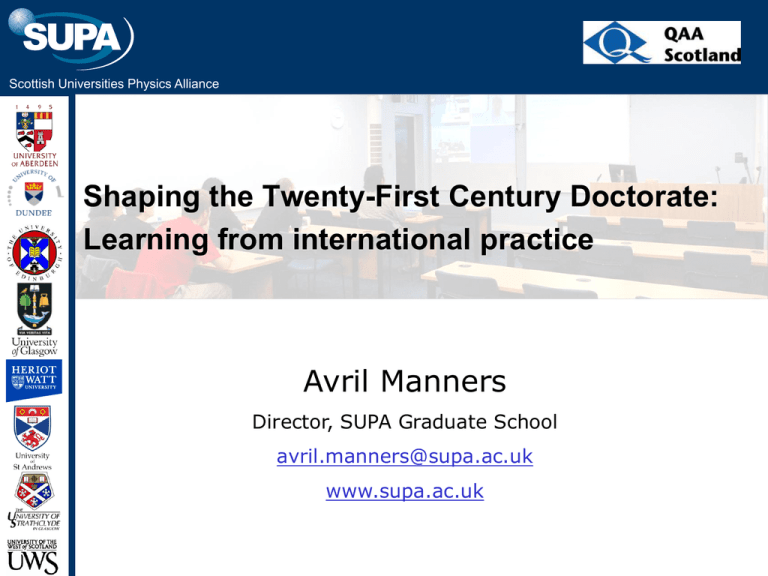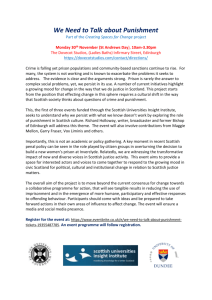Avril Manners Shaping the Twenty-First Century Doctorate: Learning
advertisement

Scottish Universities Physics Alliance Shaping the Twenty-First Century Doctorate: Learning from international practice Avril Manners Director, SUPA Graduate School avril.manners@supa.ac.uk www.supa.ac.uk SUPA Universities Scottish Universities Physics Alliance www.supa.ac.uk Scottish Universities Physics Alliance The Graduate School Scottish Universities Physics Alliance www.supa.ac.uk Who we are Scottish Universities Physics Alliance What we do Scottish Universities Physics Alliance Technical Courses across themes • • • • • • • Astronomy / Space Physics Condensed Matter & Materials Physics Energy Nuclear and Plasma Physics Particle Physics Photonics Physics and Life Sciences Core Skills Workshops, Summer Schools, Meetings, Distinguished Visitors International ‘Exchanges’ Prize Studentships Video Conferencing Scottish Universities Physics Alliance My.SUPA (VLE) Scottish Universities Physics Alliance Send an email Share a question Review lecture slides Course News Make a link to a useful article Submit assignment Try a quiz Add a comment Arrange course night out What is next lecture about? Minimum Requirements Scottish Universities Physics Alliance Every SUPA PhD student is required to complete a minimum of • 40 hours of lectures + coursework and assessment of technical studies • 20 hours or 4 days of core skills in the first 2 years of their PhD Note – Some Themes set a higher recommended level SUPA International AC Scottish Universities Physics Alliance ‘UK students need more formal training in their research areas if they are to be competitive with students from the USA and continental Europe’ Reviews Scottish Universities Physics Alliance International Review ‘Overall we believe that the SUPA Graduate School is moving in the right direction to provide a training which is competitive at the World level’ SFC Review ‘The Graduate School is exceeding expectations’ Scottish Universities Physics Alliance Scottish Higher Education Enhancement Committee (SHEEC) International Benchmarking Shaping the Twenty-First Century Doctorate: Learning from international practice http://www.enhancementthemes.ac.uk/sheec/learning-from-internationalpractice/21st-century-doctorate Scottish Universities Physics Alliance Scottish Universities Physics Alliance The overall purpose of the 21st Century doctorate work was: • to support those working in research doctoral degrees in the sector, and to identify and share national practice which will support the sector in doing this • to identify, and help the sector in comparing with and learning from international practice (including the rest of the UK) in research doctoral degrees • to establish a range of useful resources, contacts and links for institutions, Students’ Associations and practitioners • to ultimately enhance the doctoral research student experience Working Group Scottish Universities Physics Alliance • IBWG representative of all Scottish HEIs and supporting agencies • IBWG has drawn widely on practice that support and enhance the research student experience including frameworks for safeguarding academic standards and quality Six Chapters Scottish Universities Physics Alliance Ch 1 Background, rationale and methodology. Growth. Broadening by international collaborations. Student mobility. Ch 2 General support. Feedback. PT and international students. Ch 3 Academic standards, QA and review. Policy and guidance frameworks. Scottish Enhancement-led Institutional Review (ELIR). International QA systems. Ch 4 Critical mass and diversity – GS models, CDTs and POOLS. Ch 5 Skills development in the UK. RDF. Teachers, entrepreneurship, management and professional skills. Ch 6 Summarises main findings and points of interest. The report is not prescriptive but a resource for HEIs from which to adopt and adapt relevant practices. IBWG Recommendations 1 Scottish Universities Physics Alliance 1. institutions take a strategic approach to attracting home students to doctoral programmes, including consideration of diverse modes of study and sponsorship 2. all Scottish institutions take part in the Postgraduate Research Experience Survey (PRES) or conduct a similar satisfaction survey of their postgraduate research student (PGR) population and that the results are aggregated to provide quantitative evidence 3. to encourage Scottish university participation in joint international PhD programmes, Scottish higher education institutions (HEIs) collaborate to form a central resource providing funding, advice and draft agreements, drawing on experience elsewhere 4. all Scottish institutions provide research communication programmes for international PGRs and accessible support, both academic and nonacademic, for international students and their families 5. there is a need to be more proactive and structured about how academic standards and the quality of doctoral programmes are reviewed, internally and externally IBWG Recommendations 2 Scottish Universities Physics Alliance 6. it is timely to have a review of qualification titles at doctoral level, using the doctoral qualifications descriptor and Scottish Credit and Qualifications Framework (SCQF) 7. it would be useful for Scottish HEIs to consider a coordinated approach to initial and supplementary supervisor training that all supervisors are expected to engage in 8. Scottish institutions may benefit from a review of existing graduate schools and doctoral training centres, so as to optimise their effectiveness and reduce any duplication of effort 9. all Scottish institutions awarding research degrees have in place a teaching preparation programme drawing on best practice in the rest of the UK and overseas, which PGRs begin, and if possible complete, before they begin teaching 10. to assist doctoral graduates in the transition to the next step in their careers, Scottish institutions develop opportunities for postgraduate internships and affiliate programmes, drawing on best practice in the rest of the UK and internationally Impact Scottish Universities Physics Alliance SFC is restoring the £3 million reductions in Research Pooling made in AY 2011-12. The funding will be restored to each pool on condition that it is used to facilitate early career researchers’ exchanges with business and industry, both within Scotland and internationally. Each pool will be required to outline how it proposes to use these funds to enhance the employability, entrepreneurial skills and leadership abilities of early career researchers through the exchanges. The funds will complement those already offered by the Scottish Government to raise the international profile of the research pools and to allow the pools to support exchanges of an extended duration, increasing the likelihood of lasting engagement with industry. Where appropriate, placements into organisations responsible for public policy development will be permitted. This will allow the pools to address a number of the areas identified by the Scottish Government Cabinet Secretary in his letter of guidance and in Putting Learners at the Centre. Scottish Universities Physics Alliance Thank you for your attention Any questions?




